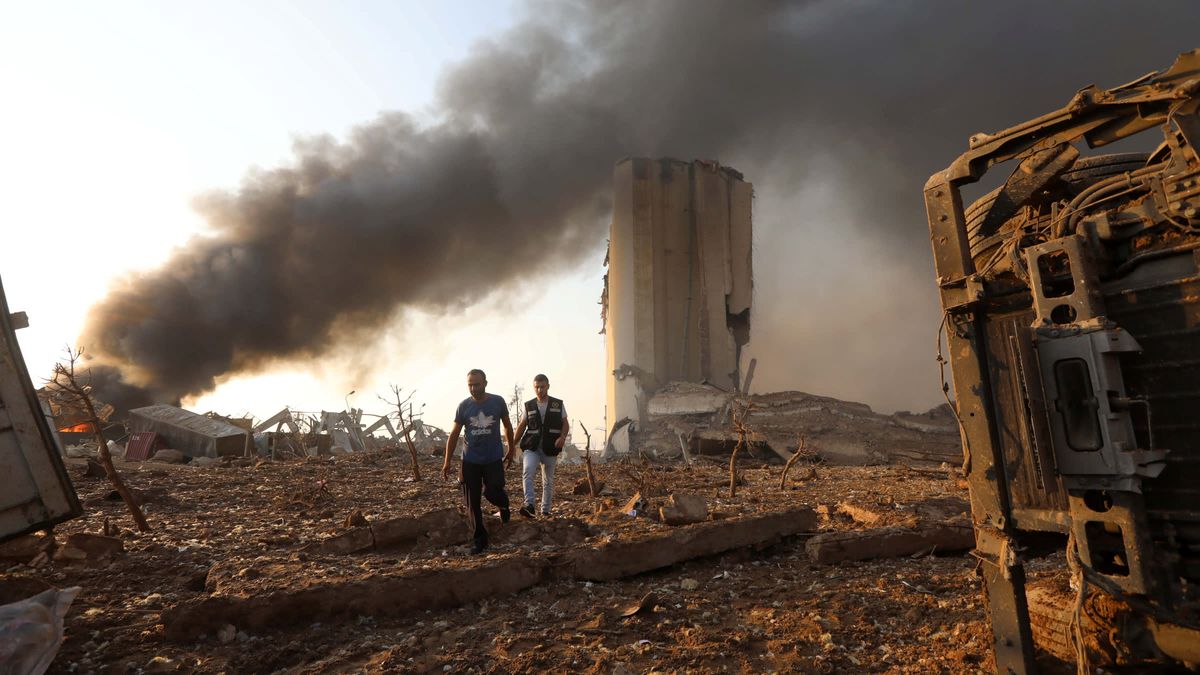Beirut declares state of emergency as residents left reeling after blasts

A few minutes every morning is all you need.
Stay up to date on the world's Headlines and Human Stories. It's fun, it's factual, it's fluff-free.
On Wednesday, Lebanese President Michel Aoun declared a two-week state of emergency following two massive explosions that ripped through the Lebanese capital of Beirut, killing at least 135 people and injuring around 5,000.
The number of casualties is only expected to rise as search and rescue missions are carried out around the city, despite shortages of electricity, medical supplies and space.
Medical facilities were hit hard by the explosion, with doctors reporting that at least four large hospitals in Beirut were damaged to the point that they were unable to treat patients. A significant number of healthcare workers were either killed or injured in the blast and a warehouse containing much of Lebanon’s vaccine supply was destroyed as well.
Dr. Peter Noun of St. George Hospital, the closest hospital to the blast site, called the sight a “catastrophe.”
“Every floor of the hospital is damaged. I didn’t see this even during the war,” he said. “The damage is extremely bad. All the rooms are damaged. All the parents and their children were in their rooms. Everything just fell down, the windows destroyed, the ceiling in pieces.”
Furthermore, an estimated 300,000 people are believed to have lost their homes, according to Beirut city governor Marwan Abboud.
The Lebanese Red Cross is working on setting up temporary shelters with food, hygiene kits and basic needs. However, these will only be able to house around 1,000 families, just a fraction of those who have lost their homes.
Located next to the blast site were Lebanon’s main grain silos. Lebanon’s economy minister Raoul Nehme said on Wednesday that they contained a crucial 85% of the country’s grain storage, which were wiped out and contaminated.
He said that while the silos at the blast site only held 15,000 tons of grain at the time, much less than their capacity of 120,000 tons, Lebanon’s remaining grain reserves could sustain the population for “a bit less than a month.”
Still, Nehme assured the public that “There is no bread or flour crisis … We have enough inventory and boats on their way to cover the needs of Lebanon on the long term.”
As residents try to recover from the damage, many are left angry at the government as initial investigation reports suggest that years of inaction and government negligence were to blame for the blast.
Prime Minister Hassan Diab has said that the explosion was most likely caused by a cache of some 2,750 tons of ammonium nitrate – a highly combustible industrial chemical commonly found in fertilizers and explosives – which was improperly stored at the ports.
Public records have shown that Lebanese customs officials wrote at least six letters to the courts between 2014 and 2017, urging them to remove the material from the port.
In an interview with local broadcaster OTV, the general manager of the Beirut port, Hassan Koraytem, said that “nothing happened” after numerous requests to the government to move the huge stockpile.
“We have been waiting for this to be resolved for six years, in vain,” he said.
By Wednesday morning, a hashtag that translates as “hang up the nooses” or “off with their heads” was trending on Twitter in Lebanon, with many harshly criticizing the government for their inaction.
As former Prime Minister Saad Hariri – who resigned in October after widespread protests – toured the city, small groups of protesters surrounded his convoy as isolated scuffles broke out between the crowd and security personnel.
While the situation appears dire, many members of the community are coming together in an effort to provide support. In an uplifting show of solidarity, unaffected residents, hotels and schools are offering shelter to those who have been displaced by the explosion.
On social media, an account was set up to try to locate victims, compiling photographs of missing people with the contact information of their families. Fundraisers were also set up online to aid those who had been affected, with some receiving up to US$2.6 million in donations.
The international community is also rushing to assist recovery efforts with governments around the world pledging their support.
The European Union has activated its civil protection system to gather emergency workers and equipment from member states. Other countries such as the United States, France, Iran, Iraq, Australia, Norway and many others have committed to sending food, supplies and emergency responders to the area.
Have a tip or story? Get in touch with our reporters at tips@themilsource.com

Comments ()